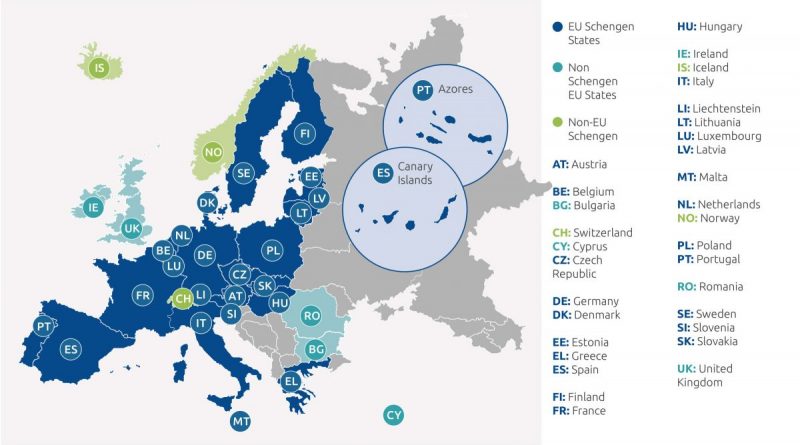What All RCBI-Professionals Need to Know About ETIAS, Europe’s Upcoming Travel Authorization System
The European Travel Information and Authorization System (ETIAS), currently under development and slated to debut in 2021, will have implications for the investment migration market. Here’s what you need to know.
What is ETIAS and who will need it to travel to Europe?
Modeled on the United States’ Electronic System for Travel Authorization (ESTA), ETIAS will compel visitors from countries that have visa-free access to the 26 countries in the Schengen area (22 EU members states, as well as Norway, Lichtenstein, Iceland, and Switzerland) to obtain a pre-clearance for entry.
The following countries that today have visa-free access to Schengen will need an ETIAS by 2021 (CIP-countries in bold):
- Albania
- Andorra
- Antigua and Barbuda
- Argentina
- Australia
- Bahamas
- Barbados
- Bosnia and Herzegovina
- Brazil
- Brunei
- Canada
- Chile
- Colombia
- Costa Rica
- Dominica
- El Salvador
- Grenada
- Guatemala
- Honduras
- Hong Kong
- Israel
- Japan
- Kiribati
- Macao
- Macedonia
- Malaysia
- Marshall Islands
- Mauritius
- Mexico
- Micronesia
- Moldova
- Montenegro
- New Zealand
- Nicaragua
- Palau
- Panama
- Paraguay
- Peru
- Saint Kitts and Nevis
- Saint Lucia
- Saint Vincent
- Samoa
- Serbia
- Seychelles
- Singapore
- Solomon Islands
- South Korea
- Taiwan
- Timor Leste
- Tonga
- Trinidad and Tobago
- Tuvalu
- Ukraine
- United Arab Emirates
- United Kingdom
- United States of America
- Uruguay
- Vanuatu
- Venezuela
How will ETIAS work in practice?
Travelers fill out a 10-minute application form online, at least two days prior to departure. An automated system subsequently checks the submitted information against a variety of databases and risk indicators, including (according to the European Commission):
- Existing EU information systems:
- The Schengen Information System (SIS)the Visa Information System (VIS)
- Europol data
- The Eurodac database
- Proposed future EU information systems
- The Entry/Exit System (EES),
- Interpol databases:
- The Interpol Stolen and Lost Travel Document database (SLTD)
- The Interpol Travel Documents Associated with Notices database (TDAWN),
- A dedicated ETIAS watch list and specific risk indicators.
Pending the approval of the Commission’s proposal to exchange information regarding criminal records in the EU to third-country nationals (ECRIS-TCNs), ETIAS should in the future also be able to query ECRIS-TCNs.
While the initial processing is entirely automated, applications that result in “hits” (red flags, effectively), will require manual processing.
The European Commission will formulate the risk indicators and “hits”.
The online application will cost EUR 7 for everyone between the ages of 18 and 70 and be free of charge for everyone else. Once granted, an ETIAS is valid for three years, unless the travel document expires before the three years are up.
How would it affect CIP-jurisdictions?
Nothing would change for Malta, Turkey, or Jordan. Malta remains unaffected because it is both an EU and a Schengen member state. Turkey and Jordan are not eligible for ETIAS because they do not have a visa-waiver agreement with Schengen.
What ETIAS will mean for Cyprus and Bulgaria, however, is not cut and dry. Both are EU member states but neither are within the Schengen border area. Citizens of these two countries will not need an ETIAS because they are permitted to live, work, and settle throughout the EU by virtue of their membership in it. But whether Americans, Japanese, British, and other non-EU citizens subject to ETIAS will need authorizations to visit these countries remains unsettled.
The reason is that Bulgaria and Cyprus, while currently not part of Schengen, are likely to join the border union before 2021. If they do, nationals from visa-waiver countries will need an ETIAS to visit them.
What about EU golden visa holders?
Those who have residence permits in an ETIAS country – i.e. Portugal, Spain, Greece, Malta, and so on – will not be affected because their residence permit, in itself and by extension, amounts to a travel authorization to the area.
Risks for citizenship by investment programs
Since the European Commission will formulate the risk indicators and “hits”, they could, if so-inclined politically, cherry-pick risk indicators to target CIPs.
They might, for instance, designate an incongruence between country of birth and country of citizenship a risk indicator, subjecting applicants who meet those criteria to additional scrutiny.
Is there a political appetite for additional scrutiny of RCBI-countries? It is not entirely inconceivable. In a report from January this year, the Commission indicated it would “closely monitor compliance of existing investor residence schemes with EU law to ensure that all obligatory existing border and security checks are systematically and effectively carried out by Member States.“
On the other hand, applicants who can get through the due diligence needle’s eye of a CIP should, under non-political circumstances, not prompt any security hits.
Which, if any, final and lasting impacts ETIAS will have on the investment migration market will not, and cannot, be known until the system’s coming into effect.


